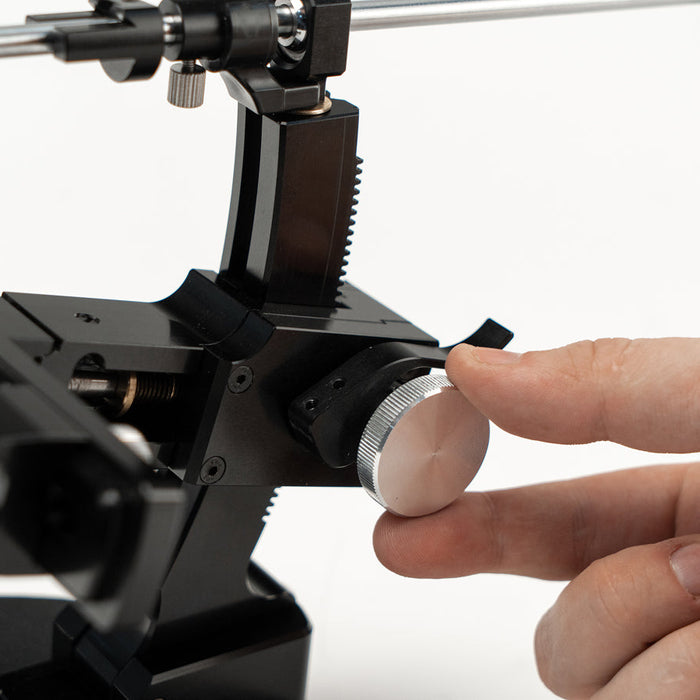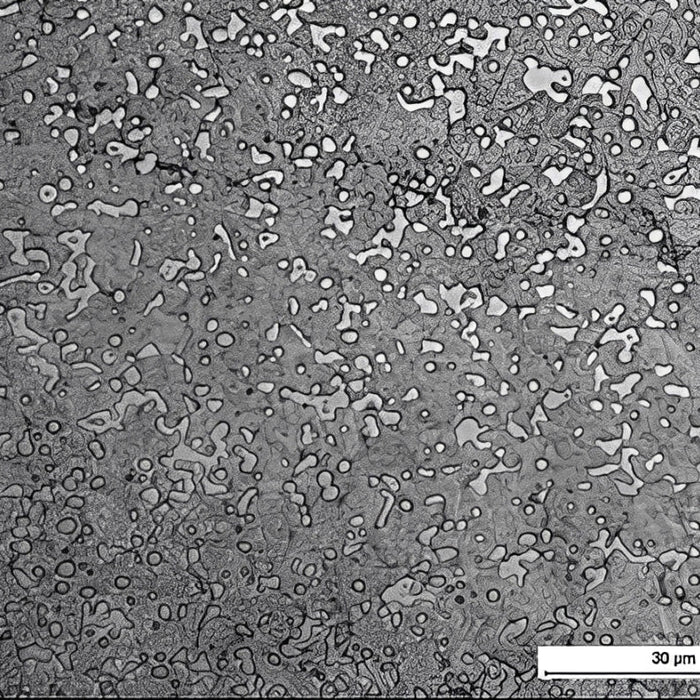History of N690
 Among the modern non-powder steels, the martensitic, cobalt-alloyed N690 steel from the Austrian-Swedish company Böhler-Uddeholm AG is currently the most popular. And in the past few years, it has almost superseded its ancestor, classic American 440C steel, which is very similar in composition but contains more molybdenum and cobalt. According to the manufacturer, the steel is intended for the production of cutting tools, including knife blades, cutting surgical instruments, rotary knives for the meat-processing industry, corrosion-resistant roller bearings, pistons for refrigeration machines, etc. The main qualities of N690 are: good strength and ductility, high wear resistance, good machinability, dimensional stability, polishability, and high corrosion resistance.
Among the modern non-powder steels, the martensitic, cobalt-alloyed N690 steel from the Austrian-Swedish company Böhler-Uddeholm AG is currently the most popular. And in the past few years, it has almost superseded its ancestor, classic American 440C steel, which is very similar in composition but contains more molybdenum and cobalt. According to the manufacturer, the steel is intended for the production of cutting tools, including knife blades, cutting surgical instruments, rotary knives for the meat-processing industry, corrosion-resistant roller bearings, pistons for refrigeration machines, etc. The main qualities of N690 are: good strength and ductility, high wear resistance, good machinability, dimensional stability, polishability, and high corrosion resistance.
N690 features
The main advantage of this steel in the production of knives is undoubtedly its balanced composition.
-
High corrosion resistance - performs exceptionally well in moderate and humid climates, resisting rust even during extended outdoor use.
-
Moderate edge retention - retains sharpness well for general outdoor use but falls short of high-wear steels such as D2 or PGK when cutting highly abrasive materials.
-
Consistent heat-treatment response - can be hardened up to 60 HRC and endures significant edge load during chopping or camping tasks without fracturing when heat-treated correctly.
-
Balanced cost/performance ratio - it offers great quality at a lower cost than powder steels such as M390 or S35VN, making it a practical choice for mid-range and professional knives.
This alloy is well resistant to corrosion, can be heat-treated to 60 HRC and retains high impact toughness. However, like 440C, N690 is inferior in sharpness retention to its popular competitors, such as D2 or PGK. The closest to it in composition, apart from 440C, are Japanese VG-10, AUS-10, as well as Russian 95X18. However, more advanced manufacturing techniques and higher quality give Bohler's products a certain edge. In particular, the use of cryogenic treatment with liquid nitrogen is recommended for hardening. This results in the removal of residual stresses and reduces the steel's tendency to chip, which is often found on its analogues when working hard with rough materials.
This steel is often used on folding knives as well as on various fixed-blade camping and hunting knives. It should be noted, however, that for camping knives it is more suitable, as the steel does not have a high retention of sharpness when used on complex and quite abrasive materials, such as bear skins or large hoofed animals. In camping conditions, on the other hand, the steel performs very well. In a moderate climate, this steel does not rust, withstands considerable stresses on the edge of the blade, and can be used for chopping. This steel is also suitable for folding knives, primarily because of its high corrosion resistance and good ductility.
Steel composition
Carbon
The carbon (C) content is about 1.08%, it increases the strength of the steel and gives the metal the necessary hardness. Carbon is the most important element of the alloy and the amount of carbon in N690 is the golden mean for a non-powder alloyed metal.
Chromium
The amount of chromium (Cr) is about 17.30%. Chromium affects the anti-corrosion properties of steel and to some extent increases its wear resistance. The amount of chromium in N690 is very high which guarantees excellent corrosion resistance.
Molybdenum
The steel contains a sufficiently high percentage of molybdenum (Mo), about 1.10% - which prevents the fragility and brittleness of the blade and gives it the necessary rigidity.
Vanadium
One of the most important elements in modern steels is vanadium (V), the amount of which in N690 is not high - 0.10%. It is responsible for strength, impact toughness and wear resistance. Vanadium also enhances the properties of chromium and makes the knife steel inert to aggressive chemical environments.
Cobalt
The alloy also contains 1.50% of cobalt (Co). Cobalt increases the strength and hardness of knife steel, improving edge retention and allowing the use of higher hardening temperatures during heat treatment. It also enhances the effect of other alloying elements and increases wear resistance. Also, thanks to the addition of cobalt, N690 shows good results in secondary hardening.
N690 steel composition table
|
Steel
|
Country
|
C (%)
|
Cr (%)
|
Mo (%)
|
V (%)
|
Co (%)
|
Si (%)
|
HRC
|
|
N690
|
Austria
|
1,07
|
17,30
|
1,10
|
0,10
|
1,50
|
0,40
|
58-60
|
How to sharpen N690
It is easy to sharpen N690 steel with TSPROF sharpeners. The maximum hardness of the steel is 60 HRC. This makes it possible to work on such blades practically with any abrasives: aluminium oxide (Boride T2 and PC series), silicon carbide (Boride CS- HD, TSPROF CS), as well as diamond bars of the Venev Diamond Plant. The N690 can be sharpened quickly and is easy to deburr if it has a proper heat treatment.
N690 vs Other Knife Steels
N690 strikes a balance between edge retention, corrosion resistance, and manufacturability that few steels match at its price.
N690 vs other steels comparison table
| Steel |
Edge
Retention
|
Toughness |
Corrosion
Resistance |
Sharpening
Ease |
Typical
HRC |
| N690 |
High |
Medium |
Excellent |
Medium |
58–60 |
| VG-10 |
Medium-High |
Medium |
Excellent |
Easier |
58–60 |
| 440C |
Medium |
Medium-High |
Good |
Easy |
57–59 |
| M390 |
Very High |
Medium-Low |
Excellent |
Difficult |
60–62 |
| 154CM |
High |
Medium |
Very Good |
Medium |
58–60 |
Conclusion
Böhler N690 remains a benchmark for balanced performance in modern stainless steels. It offers the sweet spot between edge retention, corrosion resistance, and ease of heat treatment, without the high cost or complexity of newer powder alloys.
Its trade-off is clear: you give up a bit of impact toughness to gain outstanding stainless properties and dependable sharpness. But for real-world use, such as everyday carry, outdoor, or kitchen knives, that’s a winning compromise.
N690 is still one of the most trustworthy and versatile steels on the market: easy to maintain, consistent to work with, and proven to perform year after year.











